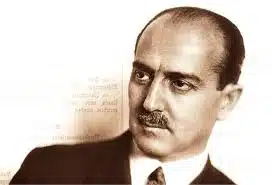
A group of individuals forms a society and a man is a social animal. The relations between individuals and society have been changing since ancient times. Every human needs a society to develop its personality. Every human being is born with certain expectations which result in a conflict of desires. Various theories have been propounded for balancing the welfare of the society and individual. For maintaining the proper functioning of the legal framework, the interests of an individual, society and public at large were needed to be considered and recognised. Hence, the theory of social engineering formulated by Roscoe Pound has come up to fulfil the maximum human desires.
Roscoe Pound (1870-1964)
An American legal scholar and professor served as a Dean of University of Nebraska College of Law and Dean of Harvard Law School. From 1949 to 1952, he served as a member of North-western University, the University of Chicago Law School and the faculty at UCLA School of Law. He was identified as the most cited legal scholar of the 20th century by The Journal of Legal Studies.
Theory of social engineering
Roscoe Pound conceived law as a ‘social engineering’, its main task being to accelerate the process of social ordering by making all possible efforts to avoid conflicts of interests of individuals in society. Thus, courts, legislators, administrators and jurists must not work with a plan and make an effort to maintain a balance between the competing interests in society. Pound compared lawyers to engineers. According to Pound, fulfilment of the maximum wants with the minimum usage of resources is the main aim of social engineering. He enumerated the various interests which the law should seek to protect and classified them into three broad categories – Private interests, Public interests and social interests.
(i) Private interests: According to Pound, private interests are the desires of an individual. These include:
(a) individual’s interest of personality, namely, interests of physical integrity, reputation, freedom of violation and freedom of conscience. They are safeguarded by laws of crimes, contracts, torts, constitutional law, etc.
(b) the interests of domestic relations of persons husband and wife, parent and children, marital life are also the individual’s private interests.
(c) The interest of the property, testamentary disposition, succession, association, freedom of contractual relations, etc. are also included under the classification of private interests.
(ii) Public interests: According to Pound, public interests are desires of the public in a politically organised society. These include:
(a) interest in the preservation of the state as such,
(b) state as a guardian of social interests such as administration of trusts, protection of the natural environment, charitable endowments, seashores, territorial waters, regulation of public employment and so on.
(iii) Social interests: According to Pound, social interests are the desires of social groups in terms of social life. These include:
(a) interest in the preservation of peace, security of transactions, general health etc.
(b) preserving social institutions such as political and economic institutions, religion etc.
(c) interest preserving general morals by prohibiting transactions against morality like gambling, drunkenness, prostitution etc.
(d) interest in the conservation of social resources like reformation of delinquents, protection of economically weaker sections of the society, natural resources etc.
(e) social interest and general progress including political, economic and cultural progress. For Example-freedom of trade and commerce, encouragement to arts, freedom of speech and expression and promotion of higher education etc.
(f) interest promoting human personality by enabling an individual to live physical, social, cultural, political and economical to suit his taste and enhance his personality.
Postulates of Roscoe Pound: To evaluate the conflicting interests in due order of priority, pound suggested that every society has certain basic assumptions upon which its ordering rests, though, for most of the time rather than being expressly formulated, they may be implicit. These assumptions may be known as Jural postulates of the legal system of that society. The pound has referred to five jural postulates as follows:
Jural postulate I: In civilized society men must be able to assume that other men will commit no intentional aggression upon them.
Jural postulate II: In a civilized society man must be able to assume that the main control for beneficial purposes what they have discovered and appropriated to their users what they have created by their own labour and have developed under the prevailing economic and social order.
Jural postulate III: In a civilized society man must be able to believe that the other members of the society will act in good faith and therefore –
(a) will make good reasonable expectations which their vows or other behaviour reasonably create
(b) will carry out their undertaking according to the expectations keeping in view the moral sentiments of the community attached thereto
(c) will restore particularly or by equivalent what comes to them by omission, failure of the presuppositions of an agreement, or other unanticipated situation where buy the receive at others expense what they could not reasonably have anticipated receiving under the actual possibilities.
Jural postulate IV: In a civilized society, men must be able to assume that others engaging in some course of conduct will act carefully for the prevention of an unreasonable risk of injury upon other members of the society.
Jural postulate V: In a civilized society, men must be able to assume that those who engage in maintaining things or employing agencies, harmless in the sphere of their use but fatal in their ordinary actions somewhere else, and having a natural tendency to cross the boundaries of their satisfactory use, will prevent them from going out of the proper bounds.
Criticism-
Dr Allen has criticized the utilitarian approach in Pound’s theory as it confines the interpretation of ‘wants and desires to the only material welfare of one’s life and completely ignoring the personal freedoms which are equally important for a happy and social living.
It has also been argued that Pound’s theory of interests has no significance in a pluralistic society where there are linguistic, ethnic, and religious minorities having diverse interests. Harmonizing their divergent interests is by no means an easy task to be performed through law and courts.
Dr Friedman has expressed doubts about the value of classification of interests and remarked that “there is a danger of an implicit grading of interests as either individual, public social because there are changing conceptions as has been accepted the found himself. Not only that, the respective value of these interests and their evaluation also depends on changing political and legal system. “
Conclusion –
Roscoe Pound based his theory of social engineering on the assumption that the protection of interests is the main subject matter of law and jurists must make a valuation of these interests for the fulfilment of human desires to obtain an equilibrium between stability and social change. Thus, adopting a functional approach to law, Pound stresses the need for study of law in relation to and as a part of the whole process of social control.





